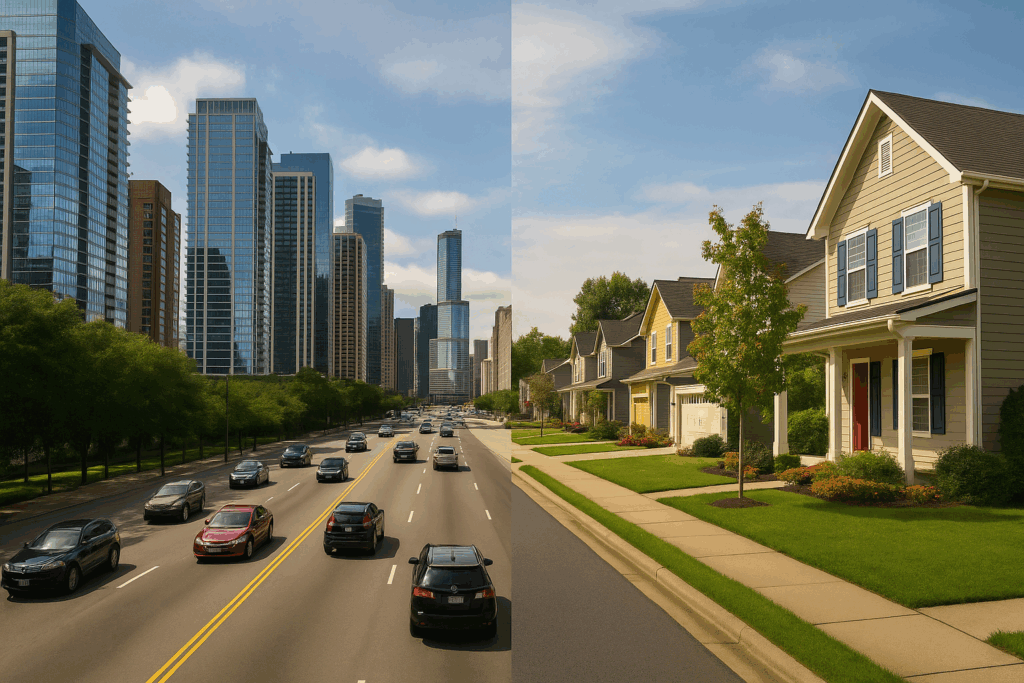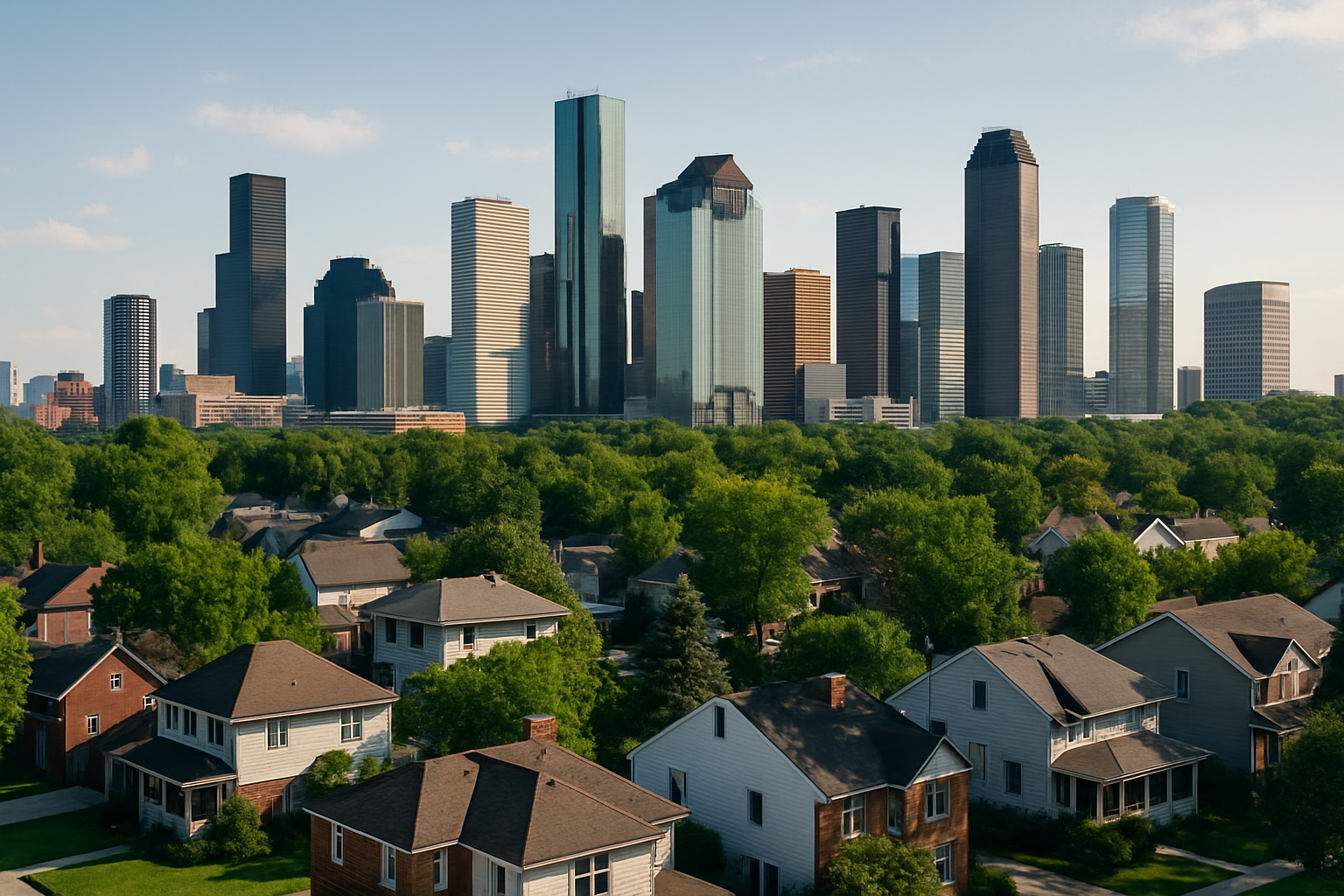
Choosing a place to live is one of the most significant decisions people make in their lives. It influences not just daily routines but also financial stability, mental health, social interactions, and even long-term career opportunities. The age-old debate of city center vs. suburbs remains as relevant today as ever. Each option offers unique advantages and challenges, making it essential to evaluate your priorities carefully before deciding where to settle.
In this comprehensive article, we’ll explore all aspects of urban and suburban living: the lifestyle, costs, convenience, environment, social life, family considerations, and more. By the end of this analysis, you’ll have a clearer understanding of what aligns best with your needs and values.
Table of contents for the article
ToggleUnderstanding the Two Options
Downtown Living: The Heart of the City
Living downtown means residing in the central part of a city. This area usually features high population density, a concentration of businesses, entertainment venues, cultural attractions, and public transportation. Downtown is often synonymous with a fast-paced lifestyle and 24/7 activity.
Suburban Living: A Quieter, Residential Life
Suburbs are residential communities situated outside the main city. They tend to have lower population density, more green spaces, larger homes, and quieter neighborhoods. The suburban lifestyle is often associated with family life, privacy, and a slower pace.
Lifestyle: What Kind of Life Do You Want?
One of the most immediate differences between downtown and suburban living is the lifestyle they offer.
Urban Lifestyle
If you thrive on excitement, culture, and variety, city life might suit you better. Downtown areas are alive with energy: cafes, bars, theaters, galleries, and diverse dining options are just a walk away. You can attend concerts, join social clubs, and participate in cultural events regularly.
The convenience of being close to everything cannot be overstated. Groceries, fitness centers, pharmacies, and medical facilities are typically located within a short distance. For people who hate long commutes or don’t drive, city living can save a lot of time.
On the flip side, city life can be noisy, crowded, and stressful. Some people find it overwhelming and feel burned out by the constant hustle.
Suburban Lifestyle
In contrast, suburban life tends to be quieter and more predictable. Streets are less crowded, and neighbors may even know each other personally. For many, this sense of community is a huge benefit. There’s more space — not just inside your home but also outside, in your yard or nearby parks.
The downside? Suburban life can feel isolating, especially if you’re used to the buzz of the city. You may need to drive everywhere, and spontaneous nights out become less convenient. For singles or young professionals, suburbs may seem dull compared to downtown.
Cost of Living: Budget Matters
Your financial situation plays a significant role in this decision.
Downtown Costs
Living downtown is generally more expensive. Rent and property prices per square foot are significantly higher because of demand and limited space. For the same price you’d pay for a small apartment downtown, you might afford a much larger house in the suburbs.
On the other hand, city dwellers often save on transportation and even groceries. Many people in the city do not own a car and rely on walking, biking, or public transit. Dining out and entertainment options can also vary greatly in price, with both high-end and budget choices available.
Suburban Costs
While housing is more affordable in the suburbs, you might spend more on commuting and maintaining a car. Gas, parking, tolls, and vehicle maintenance can add up quickly. Families might also find themselves paying more for childcare or private schools if the local schools aren’t up to par.
Commuting and Transportation
Downtown
If you work downtown, living there makes commuting a breeze. Many residents walk, bike, or take the subway or bus to work. This is not only convenient but can also save money and reduce stress compared to driving in traffic.
However, driving in a city is often a nightmare: parking is scarce and expensive, traffic jams are common, and the cost of owning a car can be prohibitive.
Suburbs
In the suburbs, owning a car is usually a necessity. Most suburban areas lack adequate public transportation, so commuting to work in the city can take a long time, especially during rush hours. That said, suburban areas near commuter rail lines or expressways may offer a manageable daily journey.
Space and Comfort
One of the strongest arguments in favor of suburban living is space.
Urban Homes
Downtown apartments are generally smaller, and outdoor space is rare. For singles or couples without children, this might be perfectly fine — even ideal. However, for families or anyone who values having a yard or garden, city living can feel cramped.
Suburban Homes
Suburbs offer larger homes, often with backyards, garages, and more storage. This can improve your quality of life if you value privacy, outdoor activities, or plan to raise a family.
Safety and Environment
Crime Rates
Urban areas tend to have higher crime rates compared to suburban neighborhoods. Petty theft, car break-ins, and even violent crime are more common in densely populated downtowns. That said, many cities have safe, secure neighborhoods as well — but they often come at a premium.
Pollution and Noise
Cities are noisy and polluted. The constant flow of cars, buses, and construction can be hard on your health. Air quality in cities is often worse than in the suburbs, where greenery and open spaces prevail.
Suburban living offers quieter, cleaner surroundings, with less light pollution and more chances to enjoy nature.
Social Life and Networking
If social life and career networking are priorities, city living has a clear advantage. The density of people and businesses creates countless opportunities to meet new people, attend events, and build professional connections.
Suburbs, while offering strong community ties, often lack diversity in social opportunities, especially for singles or young professionals.
Family and Education
Families with young children often prefer suburban living because of better public schools, safer neighborhoods, and more space for kids to play. However, some urban areas have excellent private and charter schools, though they may come with high tuition costs.
If you value diversity and cultural exposure for your children, urban living can provide that in spades, while the suburbs offer stability and calm.
Career Opportunities
While remote work is more common now than ever, being in the city still often provides better career opportunities, especially in industries like finance, tech, law, and media. If your job requires you to be present at an office or attend frequent networking events, downtown living can save time and energy.
Psychological and Emotional Wellbeing
Downtown
Some people thrive in the city’s energy — they feel inspired, motivated, and alive in an urban setting. Others find the pace exhausting, leading to stress, anxiety, and even burnout.
Suburbs
Suburban life offers more peace and quiet, which can reduce stress and improve mental health. However, it can also feel isolating and monotonous for those who crave excitement and variety.
Who Should Live Where?
Downtown Is Better For:
Young professionals looking to build their careers.
Singles who enjoy an active social life.
People who value convenience over space.
Those who don’t mind noise and activity.
Suburbs Are Better For:
Families with young children.
People who value privacy, safety, and space.
Those looking for more affordable housing options.
People who don’t mind commuting.
The Hybrid Option: Best of Both Worlds?
Many people now seek neighborhoods that offer a blend of urban and suburban benefits. These “urban suburbs” or “inner-ring suburbs” feature walkability, diverse dining and cultural options, and good schools, while still maintaining lower density and safer streets.
How to Decide: A Checklist
Here are some questions to ask yourself before making a decision:
 Do I prefer convenience or space?
Do I prefer convenience or space? How important is safety and quiet to me?
How important is safety and quiet to me? What is my budget?
What is my budget? Do I plan to start or grow my family soon?
Do I plan to start or grow my family soon? How important are career opportunities and networking?
How important are career opportunities and networking? Do I own a car, and how much does commuting bother me?
Do I own a car, and how much does commuting bother me? Do I enjoy a fast-paced environment or a slower, calmer one?
Do I enjoy a fast-paced environment or a slower, calmer one?
By honestly answering these questions, you can weigh the pros and cons in light of your personal values and circumstances.
Conclusion
There is no universally “better” choice between living downtown or in the suburbs. It depends entirely on your individual priorities, lifestyle, and future goals. While downtown living offers unparalleled convenience, energy, and opportunities, it comes with higher costs, noise, and limited space. Suburban life provides more comfort, privacy, and affordability, but often at the expense of longer commutes and less excitement.
In the end, the best place to live is the one that makes you feel at home — where your daily life aligns with your values and brings you peace of mind. Whether you choose the heartbeat of the city or the calm of the suburbs, what matters most is creating a space that nurtures your happiness and well-being.
📈 Still unsure? Consider trying each lifestyle before making a permanent decision — rent an apartment downtown for a few months or spend weekends in the suburbs to see which feels more like home.






